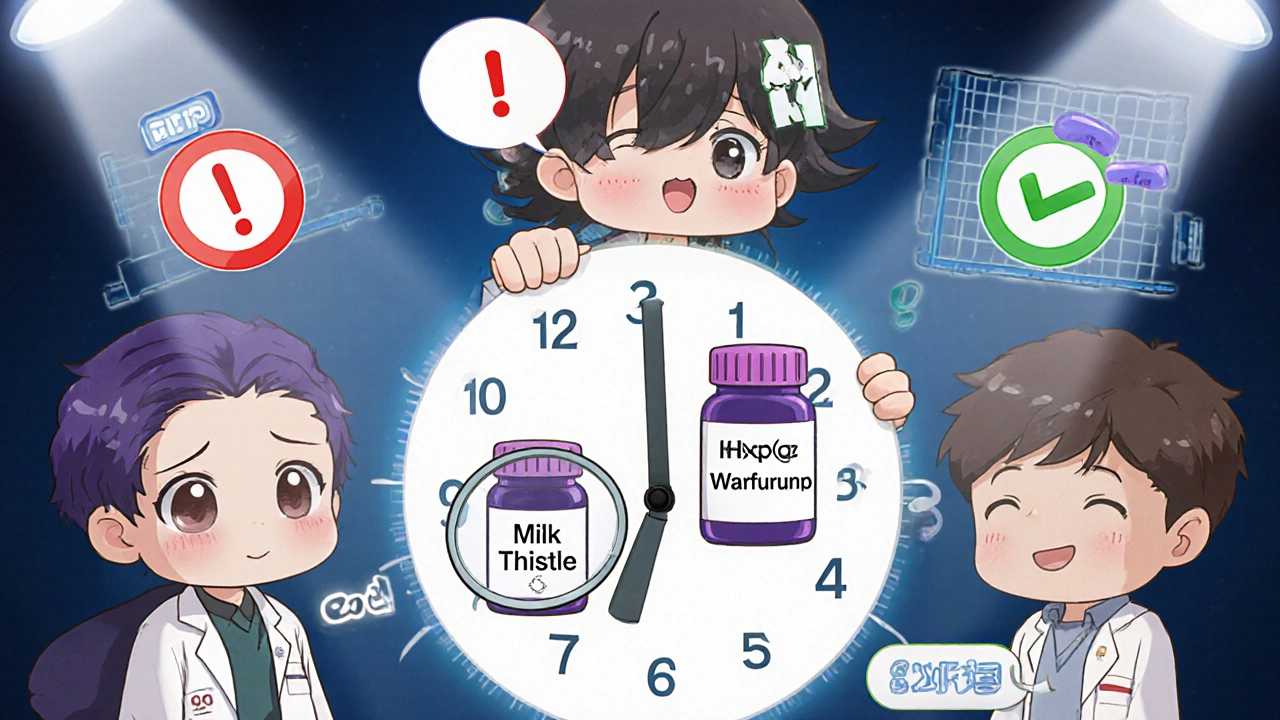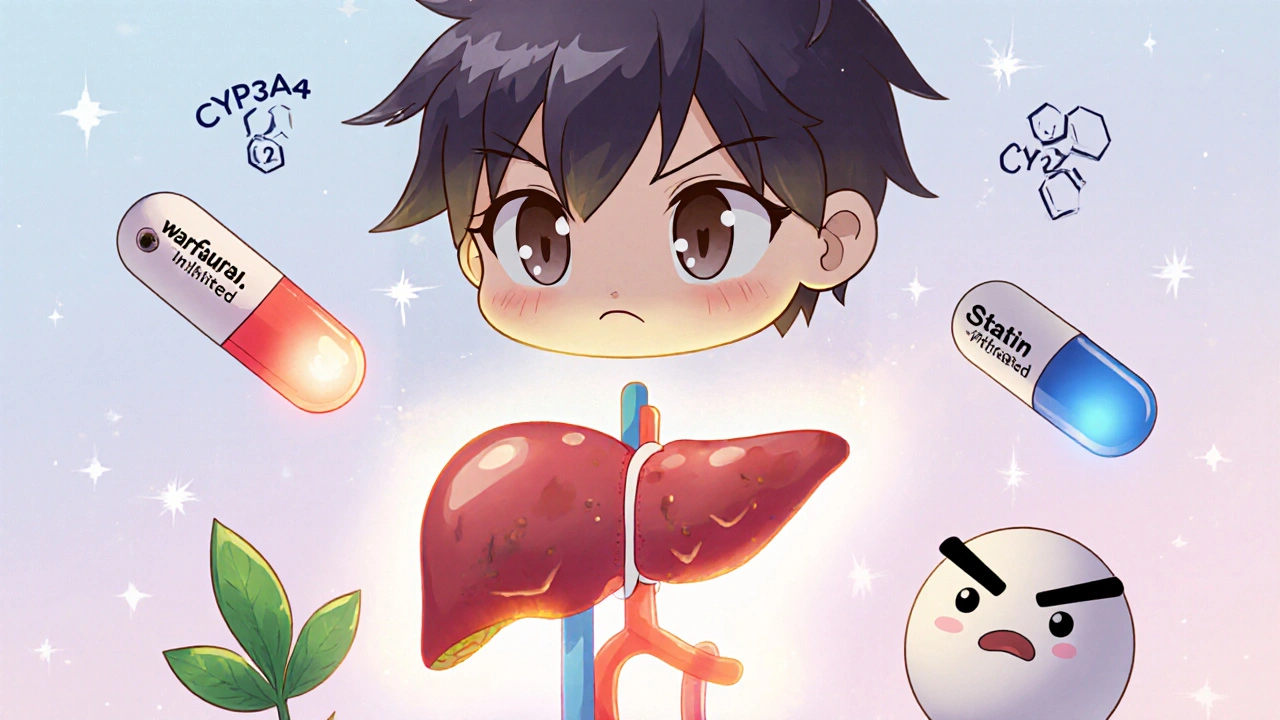Milk Thistle and Liver-Metabolized Drugs: What You Need to Know About Enzyme Interactions
18 Nov, 2025Milk Thistle & Medication Interaction Checker
Check Your Medications
Enter the names of medications you're currently taking. We'll check if they interact with milk thistle based on liver enzyme metabolism.
Important Notes
Remember: Milk thistle can both inhibit and induce liver enzymes, sometimes changing over time. This tool provides general guidance but doesn't replace professional medical advice.
Key points:
- Short-term use may inhibit enzymes, while long-term use may induce them
- For narrow therapeutic index medications, effects can be dangerous
- Always consult your doctor or pharmacist before starting milk thistle
People take milk thistle for their liver. It’s one of the most popular herbal supplements out there-especially for those with fatty liver, hepatitis, or just wanting to feel like they’re giving their body a reset. But here’s the part no one talks about loud enough: milk thistle doesn’t just sit quietly in your liver doing its job. It talks to your medications. And sometimes, that conversation gets messy.
What Milk Thistle Actually Does in Your Body
Milk thistle isn’t just a trendy supplement. Its active ingredient, silymarin, is a mix of compounds-mainly silybin-that have been studied since the 1960s. German scientists first noticed it protected the liver from toxins. Today, we know it helps reduce inflammation, fights oxidative stress, and may even support liver cell repair. That’s why it’s used for NAFLD (non-alcoholic fatty liver disease), alcohol-related liver damage, and even as a supportive therapy during hepatitis treatment.
But here’s the catch: silymarin doesn’t just protect your liver. It also messes with the enzymes that break down your prescription drugs. These are called cytochrome P450 enzymes-specifically CYP3A4, CYP2C9, and CYP2D6. They’re the workhorses of your liver, processing about 70% of all medications. When milk thistle interferes, it can make drugs stick around longer-or get cleared out too fast.
The Confusing Science: Inhibition vs. Induction
Here’s where it gets tricky. Milk thistle doesn’t always do the same thing. Sometimes it slows down liver enzymes. Other times, it speeds them up. And it depends on how long you’ve been taking it.
Short-term use? Studies show silymarin can inhibit CYP2C9. That’s the enzyme that handles blood thinners like warfarin and seizure meds like phenytoin. One 2021 study found a 15-23% drop in CYP2C9 activity with standard doses (140-420 mg daily). That means your blood thinner could build up in your system, raising your risk of bleeding.
But here’s the twist: after 28 days of daily use, the same study found CYP2C9 activity increased by 12.7%. That’s called enzyme induction. Now your drug gets broken down faster. Your INR drops. Your seizure control weakens. You don’t realize what’s happening until you feel off.
For CYP3A4-the enzyme that handles statins, immunosuppressants, and many antidepressants-the data is even murkier. A 2019 clinical trial gave 420 mg of silymarin daily to 24 healthy people for two weeks. No significant change in midazolam levels (a CYP3A4 marker). But other studies show mixed results. The bottom line? You can’t assume it’s safe just because one study says so.
Real People, Real Problems
Science tells us one thing. Real life tells us another.
On Reddit, a user posted in February 2024: “I started milk thistle for my fatty liver. Two weeks later, my INR jumped from 2.1 to 4.8. I almost bled out.” They had to cut their warfarin dose by 30%. Eighty-seven people responded. Forty-three said they had similar issues.
But flip over to Amazon. Most reviews are glowing. “Best supplement for my liver!” “No side effects!” Only 2.1% mention drug interactions. Why? Because most people aren’t on blood thinners. Or transplant meds. Or epilepsy drugs. They’re just trying to feel better.
And then there’s the FDA’s Adverse Event Reporting System. Between 2018 and 2023, there were 47 reports of possible milk thistle-drug interactions. Only nine were confirmed. That doesn’t mean the others didn’t happen. It means most doctors don’t connect the dots. They don’t ask about supplements. Patients don’t think to mention them.

Who’s at Risk?
Not everyone needs to panic. But if you’re on any of these, you need to talk to your doctor before taking milk thistle:
- Warfarin (Coumadin) or other blood thinners
- Phenytoin (Dilantin) or other seizure medications
- Statins like simvastatin or atorvastatin
- Immunosuppressants like cyclosporine or tacrolimus
- Some antidepressants and anti-anxiety meds (especially those metabolized by CYP2D6)
- Chemotherapy drugs
Even if your drug isn’t on this list, if it has a “narrow therapeutic index”-meaning the difference between a helpful dose and a toxic one is tiny-you should be cautious. That’s why transplant patients are told to avoid milk thistle. A tiny change in tacrolimus levels can mean rejection.
What About Other Liver Supplements?
People often compare milk thistle to NAC (N-acetylcysteine) or artichoke extract. NAC is great for detox support and doesn’t touch liver enzymes. Artichoke extract consistently inhibits CYP2C9-like milk thistle-but it doesn’t flip-flop between inhibition and induction. That makes it more predictable.
Ursodeoxycholic acid (UDCA), a pharmaceutical liver drug, has a clear safety profile. But it’s prescription-only, expensive, and doesn’t have the same broad antioxidant effects as silymarin. Milk thistle wins on safety-only 1.2% of users report side effects in clinical trials-but loses on predictability.

What Should You Do?
Don’t stop milk thistle cold if you’re already taking it. But do this:
- Know your meds. Look up your prescriptions. Are they metabolized by CYP2C9, CYP3A4, or CYP2D6? Google “[your drug] CYP enzyme” and check the FDA label or Drugs.com.
- Check your levels. If you’re on warfarin, get your INR checked before starting milk thistle-and again at day 7 and day 14. Same for phenytoin or cyclosporine.
- Use standardized extracts. Only buy products labeled “70-80% silymarin.” Most cheap supplements don’t even contain what they claim. A 2022 FDA study found only 32% of milk thistle products met their label claims.
- Time it right. If you’re starting milk thistle, wait at least 48 hours before checking your drug levels. Enzyme inhibition kicks in fast. Induction takes a week or more.
- Talk to your pharmacist. They see this every day. They know what your meds are. Ask them: “Could milk thistle affect my prescription?”
Why the Confusion?
There’s a big gap between what’s in the lab and what happens in real life. Clinical trials use healthy volunteers. Real patients are older, take five meds, have liver disease, or are diabetic. Their enzymes work differently. Their bodies absorb silymarin differently. Some people metabolize it slowly. Others fast. Genetic differences play a huge role.
Plus, supplements aren’t regulated like drugs. No one forces manufacturers to test for interactions. No warning labels. No requirement to report side effects. So you’re left guessing.
And doctors? A 2023 JAMA survey found only 28% of physicians felt confident advising patients on milk thistle interactions-even though 64% get asked about it.
The Bottom Line
Milk thistle is not dangerous for most people. But it’s not harmless either. If you’re healthy and just taking it for general liver support? You’re probably fine. But if you’re on medications that need precise dosing? Don’t guess. Don’t assume. Get tested. Talk to your doctor. Track your levels.
There’s no universal rule. One person can take 420 mg daily with their statin and feel fine. Another needs to cut their warfarin dose because of it. That’s why blanket advice doesn’t work. Your body, your meds, your liver-this is personal.
Respect the herb. It’s powerful. But it’s not magic. And it doesn’t play nice with everything.
Can milk thistle cause liver damage?
In rare cases, yes. While milk thistle is generally safe and used to protect the liver, some individuals have reported elevated liver enzymes after taking it. About 13.8% of studies in a 2022 review noted this paradoxical effect, particularly with high doses or in people with pre-existing liver conditions. It’s not common, but it’s documented. If you notice yellowing skin, dark urine, or persistent fatigue after starting milk thistle, stop it and get your liver enzymes checked.
How long does it take for milk thistle to affect drug metabolism?
Inhibition of liver enzymes can start within 24 to 48 hours after your first dose. But enzyme induction-where your body starts breaking down drugs faster-takes longer, usually 7 to 10 days of consistent use. This is why monitoring drug levels at day 7 and day 14 is critical if you’re on something like warfarin or cyclosporine.
Is milk thistle safe with statins?
The evidence is mixed. Some studies suggest milk thistle may slightly inhibit CYP3A4, the enzyme that breaks down simvastatin and atorvastatin. This could raise statin levels and increase the risk of muscle pain or damage. But other studies show no effect. Because statins have a narrow safety window, it’s best to check your muscle enzymes (CK levels) before and after starting milk thistle. If you’re on a statin and feel unexplained muscle soreness, stop the supplement and talk to your doctor.
Does milk thistle interact with alcohol?
No direct interaction. But both alcohol and milk thistle affect the liver. If you’re drinking regularly, milk thistle won’t cancel out the damage. It might help reduce inflammation, but it’s not a shield. If you’re using milk thistle to justify drinking, you’re misusing it. The best use is for people trying to heal their liver-not to keep damaging it.
Can I take milk thistle with antidepressants?
Some antidepressants, like sertraline and paroxetine, are metabolized by CYP2D6. Milk thistle may inhibit this enzyme, leading to higher levels of the drug in your blood. This could increase side effects like dizziness, nausea, or heart rhythm changes. If you’re on one of these meds, monitor for new or worsening side effects after starting milk thistle. Don’t stop your antidepressant without medical advice.
Are all milk thistle supplements the same?
No. Only supplements labeled “70-80% silymarin” have been studied for interactions and effectiveness. Many store brands contain less than 20% active compound. A 2022 FDA study found 68% of milk thistle products didn’t meet their label claims. Look for third-party testing (USP, NSF, or ConsumerLab) and avoid products with vague ingredients like “milk thistle extract” without percentages.
Should I stop milk thistle before surgery?
Yes. If you’re scheduled for surgery, stop milk thistle at least one week before. Even if you’re not on blood thinners, it can affect how your liver processes anesthesia and pain meds. Surgeons and anesthesiologists need to know what you’re taking. Don’t assume it’s “just a supplement”-it can change how your body handles drugs during and after surgery.
Is milk thistle safe for people with liver transplants?
Generally, no. Transplant patients take immunosuppressants like tacrolimus or cyclosporine, which have extremely narrow therapeutic windows. Even small changes in their blood levels can lead to organ rejection or toxicity. While some patients use milk thistle without issues, the risk is too high. Most transplant centers advise against it. If you’re considering it, get approval from your transplant team-not your supplement store.

Frank Dahlmeyer
November 19, 2025 AT 13:30Look, I get it-milk thistle is the new kale smoothie for your liver. But let’s be real: if you’re on warfarin and think a herbal tea is gonna fix your fatty liver without touching your diet or alcohol, you’re not healing-you’re gambling. I’ve seen three patients in six months with INR spikes after starting this stuff. No one tells you about the enzyme flip-flop until you’re in the ER. Stop treating supplements like harmless candy. Your liver isn’t a magic reset button. It’s an organ that works 24/7, and it doesn’t appreciate being lied to.
Chuck Coffer
November 20, 2025 AT 07:45Wow. Someone actually wrote a 2000-word essay on milk thistle and didn’t say ‘consult your doctor’ once. Truly groundbreaking. I’m sure the 17-year-old on Reddit who’s taking it with his Adderall and ‘feels zen’ will read this and immediately stop. /s
Marjorie Antoniou
November 21, 2025 AT 06:19I’m a nurse, and I’ve had patients come in terrified because their INR jumped after starting milk thistle. They didn’t know it could interact. They thought ‘natural’ meant ‘safe.’ I wish more people knew that ‘natural’ doesn’t mean ‘non-reactive.’ Please, if you’re on meds-especially blood thinners, seizure drugs, or immunosuppressants-talk to your pharmacist before you take anything. Not your friend on Instagram. Not your yoga instructor. Your pharmacist. They’re the unsung heroes of drug safety.
Andrew Baggley
November 23, 2025 AT 00:19My dad took milk thistle for years with his statin and never had an issue. But then he started on a new antidepressant and suddenly felt like he was walking through molasses. Turned out his CYP2D6 was getting choked. He stopped the supplement, waited a week, and the fog lifted. Point is: you can’t assume it’s safe just because it worked for someone else. Your body’s not a copy-paste. Your liver’s got its own personality. Listen to it. Test your levels. Don’t be the guy who says ‘I’m fine’ until you’re not.
seamus moginie
November 24, 2025 AT 12:44Let me just say this: if you're on cyclosporine or tacrolimus and you're even THINKING about milk thistle, you're playing Russian roulette with your transplanted organ. I know people who thought 'it's just a herb'-until their creatinine spiked and their transplant team had to scramble. There's a reason transplant centers ban it. It's not because they're anti-natural. It's because they've seen the body count. Don't be a statistic. Ask your specialist. Not Reddit. Not Amazon reviews. Your doctor who knows your bloodwork.
Reema Al-Zaheri
November 26, 2025 AT 05:14Regarding enzyme induction versus inhibition: the temporal dynamics are critical. Inhibition occurs within 24–48 hours; induction requires sustained exposure-typically 7–14 days. This biphasic response is poorly understood by consumers and even some clinicians. The 2021 study referenced (J Clin Pharmacol) demonstrated a 12.7% increase in CYP2C9 activity after 28 days, which aligns with the pharmacokinetic principle of nuclear receptor activation (PXR). Therefore, single-point INR measurements are insufficient. Serial monitoring at baseline, day 7, and day 14 is mandatory. This is not speculation. It is pharmacology.
Paige Lund
November 26, 2025 AT 11:10So… you’re telling me I can’t just take this stuff with my coffee and call it a day? Wow. Mind blown.
Codie Wagers
November 27, 2025 AT 23:08There’s a deeper truth here, buried under the pharmacokinetics and FDA reports: we’ve turned medicine into a consumer product. We want a pill, a potion, a powder that fixes our pain without consequence. Milk thistle is the perfect symbol of that delusion. We’ve forgotten that the body is not a machine you can upgrade with a supplement. It’s a living, breathing ecosystem-and every action has a reaction. The real problem isn’t silymarin. It’s the cultural arrogance that believes we can outsmart biology with a bottle from the health food aisle. We don’t need more warnings. We need humility.